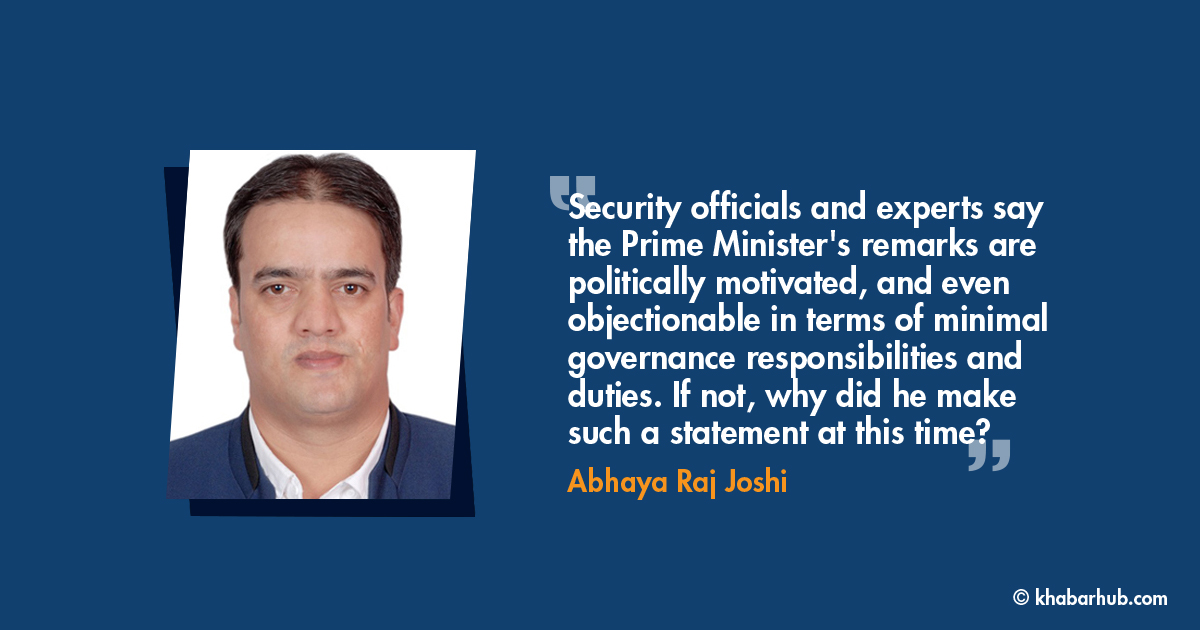0%

One of the important functions of Nepal’s security agencies (viz. Nepal Police, Armed Police Force, and Nepali Army) is also to provide VIP security to selected dignitaries.
Based on the information provided by the National Intelligence Department, different persons are provided with different categories of security.
However, the misuse of security personnel deployed in such security arrangement, by former or current high post holders, has been the management issue since long.
It is not that the Home Ministry does not have directives to regulate such security arrangements, but still one can find multiple instances where people having no security threats are also provided with VIP security.
Another important issue is the excess number of security personnel deployed for this purpose. Therefore, the Home Ministry must make a close assessment of whether the security of VIPs in Nepal is based on the Need or Obsession?
Such a statement by the country’s executive head is a serious security issue. Now, it is up to the security agencies of Nepal to figure out and analyze the actual risk based on minute assessment and take necessary actions, if need.
Regarding this, not long ago the Home Ministry has directed Nepal Police and the Armed Police Force to return their personnel deputed to the residences of some of the VIPs on duties other than security because most of the personnel sent were found to have been exploited in other works. But, still much remains to be done.
At present, among others, former and current dignitaries including head of state, prime ministers, home and other ministers, justices, chief commissioners, secretaries, and even lawmakers have been using personal security officers (PSOs).
Just the three VVIPS (the president, vice-president, and prime minister) of Nepal have 675 security personnel safeguarding them, which as per close estimates costs easily over 18 million per month.
Coming back to our original issue, many other dignitaries in Nepal are also found to have always been surrounded by a huge security presence, just like they are in a serious security threat as was during the era of armed insurgency in Nepal.
For the prime minister alone around 315 security personnel are deployed in high-security vehicles, offices, and residences, and around 90 security personnel are deployed in the ‘Z Plus’ system with state-of-the-art weapons.
Despite such security arrangements, prime minister K. P. Sharma Oli has recently confessed fear of life-threatening physical assault on him.
Such a statement by the country’s executive head is a serious security issue. Now, it is up to the security agencies of Nepal to figure out and analyze the actual risk based on minute assessment and take necessary actions, if need.
But the question that arises here is whether such a threat to the PM should be disclosed in the public circle?
Security officials and experts say the remarks are politically motivated and it even objectionable in terms of minimal governance responsibilities and duties. If not, why did the Prime Minister make such a statement at this time?
This is a wrong message flowed from the PM himself. Only when a leader loses credibility and popularity, he/she does so!
There is always some level of threat to VVIPs and VIPs. That is not a new topic. But to tell the people that I am in danger and any time there could be an attack on me implies that not only him but no one is safe in the country.
The person who is responsible for keeping the country free from internal and external security threats is feeling insecure, then the question automatically raises is how others can feel safe. Despite all the high-level security, it is a shame to say that he has a security threat.
Who is the ‘threat’ to the Prime Minister? No one I can assume. Indeed, I am surprised by such a statement by the PM. In retrospect, it is a political statement made out of being frightened by the opposition to his move within the party.
In the lack of close assessment deployment of personnel for securities of VIPs, providing them multilayer security umbrellas is becoming a show-culture for the most, if not all.
It seems that he is trying to get the support of the general public and activists through emotional means amidst this political uproar.
Coming back to our original issue, many other dignitaries in Nepal are also found to have always been surrounded by a huge security presence, just like they are in a serious security threat as was during the era of armed insurgency in Nepal.
Today level of risk to these dignitaries is average. Therefore, it is a total loss of tax payer’s money to provide such a costly and heavy security presence for a large number of current and former government officials, politicians, and other senior persons.
Nevertheless, whenever the threat is confirmed, a committee lead by the Home Ministry could decide which category of security is to be given to these VIPs at any time.
In the lack of close assessment deployment of personnel for securities of VIPs, providing them multilayer security umbrellas is becoming a show-culture for the most, if not all.
Therefore, to make the deployment arrangement based on the need rather than an obsession, the Home Minister needs to amend the existing directives and scientifically deploy security personnel for the VIPs in days to come.
(Mr. Joshi is the Chairperson of Nepal Centre for Security Governance (NCSG), a Kathmandu-based think-tank)